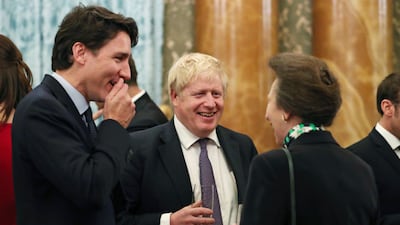Nato withstood the challenge of three of the organisation's leading members in open dispute as the alliance sealed a declaration of unity at its seventieth anniversary meeting, resolving to maintain a common front against terrorism and strengthen its defences both along its borders and against new threats in cyberspace and in space itself.
A pre-meeting threat from Turkey to veto the London meeting's declaration did not materialise and the agreed statement said that Nato would also set up a working group to flesh out issues of its future direction by next year.
“Disagreements will always attract more attention than when we agree,” said Jens Stoltenberg, the Nato secretary general after the body’s Atlantic Council meeting at a golf course resort north of London. “That’s been true as long as this alliance has existed,” he said. “We have always overcome this difference and unite on our core principles.”
In a final twist, there was a sour sign-off by President Donald Trump who was infuriated by the emergence of a video of a huddle of leaders, including Canada’s prime minister Justin Trudeau, gossiping about his press conference performances on Tuesday.
Mr Trump was scathing about the Canadian leader. "He's two faced. I find him to be a very nice guy but you know the truth is that I called him out the fact that he's not paying two per cent and I can see he's not very happy about it,” he said. "He's not paying two per cent and he should be paying two per cent. Canada - they have money.”
The US leader cancelled a final press conference and as headed back to the US the House of Representatives was opening impeachment hearings over his dealings with the leader of Ukraine.
Preparations for the summit were disrupted by an intervention from Emmanuel Macron who declared it was “brain-dead” amid a variety of disagreements. These included arguments over the amount of military spending by members, the recent Turkish offensive into Kurdish-held areas in Syria and purchase of an air defence system from Russia.
President Recep Tayyip Erdogan of Turkey had retorted it was Mr Macron that was “dead-brained” in his policies.
Mr Macron said he had several useful discussions with Mr Erdogan to clarify differences and said these would be addressed at another meeting with three European countries (France, Germany and Britain) in Turkey in the new year.
In the aftermath, Mr Stoltenberg said Turkey’s complaints over Nato members stance on he the Syrian Kurdish YPG militia, which Mr Erdogan views as a terrorist organisation was not discussed during the formal Atlantic Council session.
“It was not addressed specifically in the meeting today,” he said. “The alliance had remained united on the core issues,” he added. “We all agree on the importance of not jeopardising the gains we have made in the fight against terrorism.”
Mr Macron took a more nuanced position, noting that while the alliance regarded the PKK Kurdish faction as a terrorist outfit, its members had not done the same with the YPG.
“The terrorist threat is at the heart of our alliance.”
The US leader also met with Mr Erdogan on Wednesday and reported some coming together of positions on northern Syria in the aftermath of the Turkish incursion. “We discussed Syria. We discussed the Kurds,” said Mr Trump. “We discussed numerous things, and we’re getting along very well. The border and the safe zone is working out very well. And I gave a lot of credit to Turkey for that.”
He added that the Turks bore primary responsibility for its border with Syrians. “That’s what they’re doing,” he said. “They can use other countries if they want, if they want to spend the time and energy but this has been a border under siege for many, many decades, and it was time for us to leave, and we left, and it’s been holding very nicely.”
The French leader called Turkey’s approach to fighting terror as a policy of making choices that put it at odds with its partners despite signing on to the anti-ISIS goals of Nato. “Turkey reaffirmed its commitment to fighting ISIS but it was also clear we do not regard YPG as a terrorist group even as we are fighting the PKK,” he said.
Mr Stoltenberg played down the wider talk of differences between the allies. In a press conference after the two-hours talks, he pointed out that European allies and Canada have increased their defence budgets by $130 billion since 2016 and that figure would rise to $400 billion in extra annual spending by 2024.
One of the Trump talking points at the summit has been that the US complaints against Nato counterparts not pulling their weight when it came to military spending were bearing fruit.
“This is unprecedented, this is making us stronger,” Mr Stoltenberg added.
Pointedly the US leader met with the nine countries that have met the two per cent threshold of sending before he left.
Not invited, Mr Macron said that a concentration on military spending was not sufficient to secure the survival of the alliance, which was born as a vehicle for Western solidarity in the face of the Cold War threat from the USSR.
The election of President Trump was accelerating the US shift away from Europe and the partners had to find a way to incorporate that additional dimension into the alliance.
“The evolution of the American position has been with us for a few years now and seems to be long term,” said Mr Macron. “We have to draw conclusions from this American realignment not just from a budgetary point of view but also a capability point of view.”
Boris Johnson, the British prime minister and summit host, said that talk of a US split with Europe was not borne out by the facts. The Americans stood “shoulder-to-shoulder” with Britain and other partners, he said.








